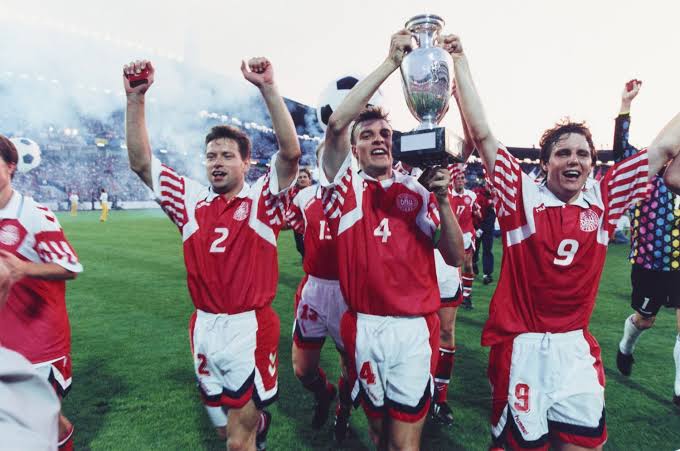Do you know why and when the current back-pass rule was introduced to football? In association football, the back-pass rule, described in Law 12, Section 2 of the Laws of the Game, prevents the goalkeeper from handling the ball when it’s passed to them by a teammate.
The current rule was introduced in 1992, shortly after Denmark won the 1992 European Football Championship by exploiting a football tactic of back-passing the ball to the goalkeeper to waste time.
Denmark, a team that wasn’t even expected to qualify for the tournament, stunned the world by emerging victorious, and their unorthodox path to glory played a pivotal role in shaping the future of the game.
The Danes’ journey to the Euro 92 title was nothing short of extraordinary. They weren’t even supposed to be in Sweden for the finals, having qualified by default after the disqualification of then powerhouses Yugoslavia due to an ongoing conflict in the country.
With only eight teams participating, the unfancied Danes found themselves on the biggest stage, determined to defy the odds. Led by Richard Moller-Nielsen, the side began their campaign with a 0-0 draw against England, followed by a narrow 1-0 defeat against the tournament hosts, Sweden.
Facing elimination, they needed to defeat France in their final group match, and they did just that, securing a 2-1 victory to reach the semi-finals.
In the semi-finals, Denmark took on the Netherlands, a team that was brimming with world-class talent at the time. In a tense encounter, the Danes emerged victorious on penalties, setting up a final clash with Germany, the tournament favourites.
The final, played at the Nya Ullevi in Gothenburg proved to be a masterclass in defensive organisation and time-wasting from the Danes.
Goalkeeper Peter Schmeichel, a future Manchester United legend, was the architect of Denmark’s conventional tactics. Schmeichel’s time-wasting ploy of taking a back pass from a teammate, waiting for an opponent to close him down, and then picking the ball up, went on and on, and became the talk of the tournament.
Denmark utilised the tedious plan of Schmeichel, which was an effective way to kill time and frustrate their opponents.
Their victory over Germany in the final, secured by a 2-0 scoreline, was a triumph of the underdog spirit, but their unorthodox tactics had far-reaching consequences.
The back-pass rule at the time, which allowed goalkeepers to pick up deliberate passes from their teammates, had become a significant issue in the game, as players monotonously passed the ball back to the keeper to waste time.
Euro 92 proved to be the final nail in the coffin for this tactic. Authorities then scrambled and got a new rule approved before the start of the 1992/93 season, and goalkeepers were no longer allowed to pick up deliberate passes from their teammates.





























